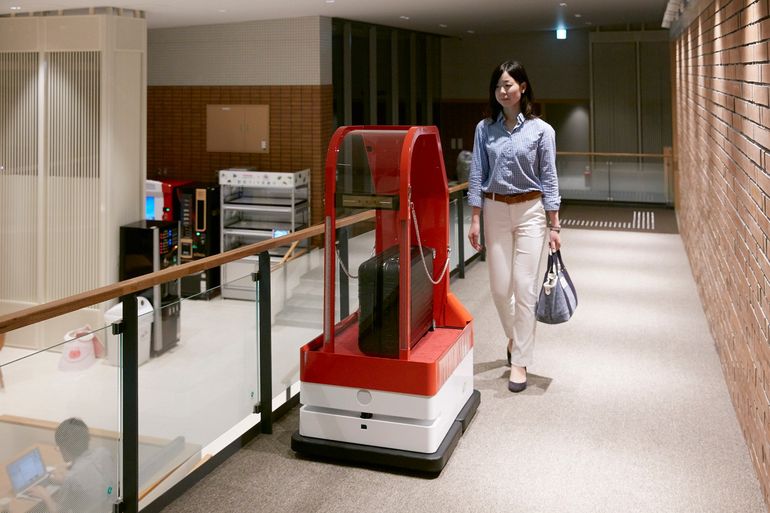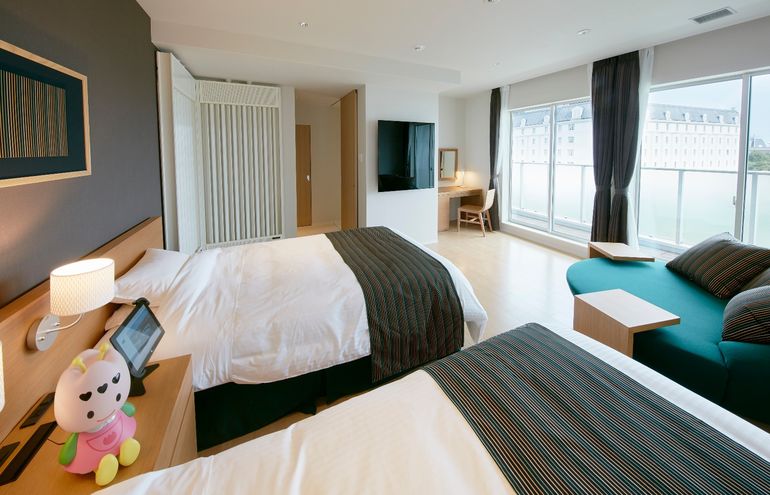
The Japanese have always been at the forefront of deploying robots to perform jobs that are traditionally done by humans. Over the past year, humanoid robots have been seen helping customers at Mitsubishi Bank, selling Nestle's espresso machines and even filling in for human science communicators at museums. Hence, it is not surprising to hear that the country is now home to a hotel that is staffed almost entirely by the Androids!
The aptly named Henn-na ("strange" in Japanese) Hotel which opened its doors on July 17 is located at Nagasaki's Huis Ten Bosch theme park. It is the brainchild of Hideo Sawada, a Japanese entrepreneur who is captivated by the possibility of replacing humans with robots. He aims to have this futuristic lodging be run primarily by the intelligent humanoids with minimal human intervention.

Guests checking-in are welcomed by a family friendly English-speaking dinosaur bot wearing a bow tie and bellhop hat. Though proficient at his job, he does request guests not to ask him "a difficult question" since he is after all, "just a robot!" Those seeking a more "regular" experience, can approach the eerily human-like Japanese-speaking robot or just do it themselves at the self-check kiosk.
When ready, visitors can request the robot "porters" (two rechargeable luggage trolleys) to help carry belongings to their room. Those that need to stow away valuables can hand them to a helpful robot who will place them inside an individual safe box in exchange for a small fee. A foot-high concierge is available to provide information about the hotel's amenities, nearby attractions, and even order a taxi if needed.

Of course, a hotel this futuristic is too cool to hand out mundane items like keycards. Instead, guests can access their rooms using the sophisticated facial recognition technology that is installed next to every door. Once inside, visitors will not have to fumble around to switch on lights or set alarm clocks. All they have to do is ask their very own personal assistant, a cute little electronic creature that resembles Hello Kitty, to do it for them.
And don't even bother seeking out the thermostats to adjust the room temperature. That's because the hotel is not equipped with air-conditioning. Instead, it is kept cool with the help of energy-efficient features like heat-absorbing bricks, reflective paint, and solar panels, as well as a network of sophisticated radiator panels. Additionally, the roof is designed at an angle that allows the winter sun in but blocks out the harsh summer rays. Each room is also equipped with sensor panels that monitor the temperature and ensure it is comfortable at all times. The unique system purportedly reduces energy usage by as much as 30%, helping both the hotel's bottom line and the environment.

If you are used to having your hotel room cleaned every day, Henn-na may not be your best option. That's because, to save costs and water, the hotel has a once-a-week room cleaning policy. Germaphobes and sloppy guests do have the choice of daily cleaning at an extra charge. Sawada says these small measures not only help the environment but also keep room prices lower than those at comparable hotels.
So how much does it cost to live in this crazy cool hotel? Depends on when you decide to go. During low season, guests can get away with paying as little $60 a night for a basic room. However, during peak season when rates are determined by an online auction, the price can get as high as $153.

In addition to doubling the current hotel's room capacity from 72 to 144 by 2016, Sawada also plans on building two additional locations. One will be in Japan and the other in a yet-to-be-disclosed country overseas. However, before embarking on those projects the businessman wants to iron out all the kinks and ensure that the world's first robot-staffed hotel runs as smoothly as a traditional human managed one.
Resources: guardian.co.uk, endgadget.com,gizmag.com